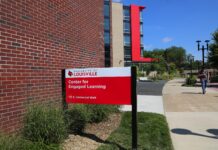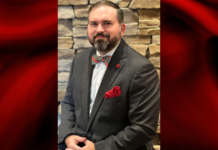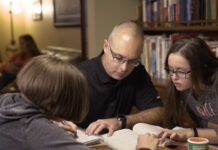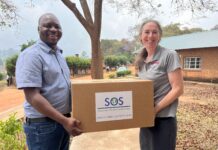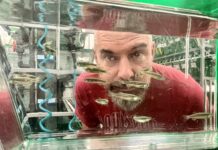LOUISVILLE, Ky. – To paraphrase Yogi Berra: It’s déjà vu all over again – with a twist.
A University of Louisville researcher known for his prowess at winning competitive grants from the National Institutes of Health has won another one – his first for clinical research.
During his 18-year tenure at UofL, Dr. Roberto Bolli has generated more than $100 million in grants for basic research from the NIH. Today, Bolli joined with University of Louisville President James R. Ramsey to announce a new NIH grant he has won for clinical research, a seven-year, $3.4 million grant from the National Heart, Lung and Blood Institute to establish one of seven regional centers across the United States in the Cardiac Cell Therapy Research Network (CCTRN). The network conducts early clinical trials of adult stem cell therapies in patients with heart disease.
“Stem cell therapy holds great promise for treating heart disease, and researchers involved in CCTRN are helping determine how these promising therapies might be most beneficial to patients,” said Dr. Sonia Skarlatos, deputy director of the Division of Cardiovascular Sciences in the NIH’s National Heart, Lung, and Blood Institute. “This new round of funding is an important step in helping to improve cardiovascular health.”
This move from basic to clinical research – from “bench to bedside” in medical lingo – will test the validity of new therapies by replicating studies in patients at two or more of the network’s centers located at UofL, Stanford University, Texas Heart Institute, Minneapolis Heart Institute, University of Florida, University of Miami and Indiana University.
Replicating studies in several locations with a large number of patients is necessary for researchers to ultimately determine which ones can be submitted to the Food and Drug Administration for approval.
“Through the work of Dr. Bolli and his team, the UofL Health Sciences Center continues to fulfill the promise of a great metropolitan research university,” Ramsey said. “Success like Dr. Bolli’s in conducting basic research lays the foundation for him to conduct clinical studies that will determine the standard of care for the future.
“Clinical trials of new adult stem cell therapies are among the most promising and exciting areas of medical research today, and being part of a national network such as the CCTRN means UofL can bring this cutting-edge medicine to the people of Kentucky and beyond.”
Bolli emphasized the new direction this grant would take his research team at UofL’s Institute of Molecular Cardiology where he is director. “Basic research explores new theories and measures the effectiveness of new therapies in preclinical animal models of human disease,” Bolli said. “Clinical research takes what has been learned in basic research and applies it to examine whether therapeutic interventions work to heal the body or arrest disease in patients. This grant makes UofL one of the few clinical research centers in the nation offering adult stem cell therapies to patients.”
Bolli and his team will study whether the use of various types of adult stem cells is safe and effective in treating cardiovascular disorders such as heart failure, heart attacks and peripheral arterial disease, a condition in which there is insufficient blood flow to the legs.
The stem cell infusions and clinical studies will be performed at Jewish Hospital, a part of KentuckyOne Health, by Bolli’s team along with the team of Dr. Mark Slaughter, chief of the Division of Thoracic and Cardiovascular Surgery at UofL. Because the NHLBI funds the procedures separately from the grant allocation, Bolli said he expects an additional $4 million will be brought to Louisville as a result of participating in the CCTRN, making the total amount of money awarded in this grant estimated at $7.4 million.
The CCTRN grant is the third largest, multi-project NIH grant involving adult stem cells won by UofL’s Institute of Molecular Cardiology. Another of Bolli’s NIH-funded projects is the COBRE grant that is ongoing and is looking into using adult stem cells in diabetes and obesity.
The third is Bolli’s NIH Program Project grant, which studies the function of cardiac stem cells at the basic level. Insights gained under this grant led Bolli to conduct the SCIPIO trial, which investigated the safety of infusing the stem cells of adult heart failure patients into their hearts. While the trial was intended to test primarily the safety of the procedure, the 16 patients who participated in that research trial saw triple the expected rate of improvement in their heart function when the results were reported in November 2011.
“After results of the SCIPIO trial were reported, we received hundreds of inquiries from patients all over the world who were seeking this therapy,” Bolli said. “We know that there are thousands of people who seek stem cell treatment for what are today incurable diseases; all of their stories are moving and most are heart-wrenching because they have been told there is nothing that can be done for them at this time.
“My colleagues and I look forward to working with the NIH and the other universities and institutes in the CCTRN to hopefully make adult stem cell therapy a clinical reality for patients who otherwise have no options,” he said.









